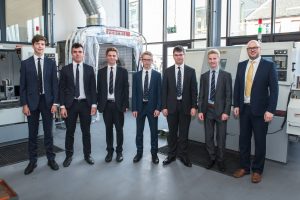 A record number of Oundle School pupils have each been awarded a much sought-after Arkwright Engineering Scholarship that identifies them as some of the country’s future leaders in engineering and related areas of design.
A record number of Oundle School pupils have each been awarded a much sought-after Arkwright Engineering Scholarship that identifies them as some of the country’s future leaders in engineering and related areas of design.
The boys, Ben Bird (16), Christopher Bird (16), Nikita Belenkov (16), Edward Jinks (16), Reuben Parry (16) and Arthur Thomson (16) were selected for their potential as future engineering leaders during an assessment process which looked at their academic, practical and leadership skills in STEM (Science, Technology, Engineering and Mathematics). These are assessed through a rigorous selection process comprising: an assessed application form including a teacher’s supporting reference; a two-hour aptitude exam; and a university-based interview. The scholarships support STEM pupils through their Sixth Form studies and encourage them into top universities or higher apprenticeships.
The scholarships consist of an annual financial award to each Scholar and their school, and a range of enrichment activities, such as mentoring and industry visits, that enhance a Scholar’s experience of engineering and technical design in a real-world context. Arkwright Engineering Scholarships are highly regarded by universities and industry and are one of the most prestigious accolades that a talented Sixth Form pupil can achieve.
Ben, whose scholarship is sponsored by The Reece Foundation, is taking Maths, Further Maths, Physics and Geography for A level. He intends to study Structural or Mechanical Engineering at university.
Chris, whose scholarship is sponsored by Bristol University Civil Engineering department is currently studying Maths, Physics, German and History and intends to study either Civil or Mechanical Engineering at university. At the moment he is working on an Extended Project Qualification on the future of mountain bike design.
Nikita, whose scholarship is sponsored by The Eranda Rothschild Foundation, is studying Maths, Further Maths, Physics and Computing and hopes to study Electronic and Information Engineering at university. He is currently building an eight bit computer.
Ed, whose scholarship is sponsored by Sir William Lyon’s Charitable Trust, is currently studying Maths, Further Maths, German and Computing and hopes to study computer science at university. For his Extended Project Qualification, Ed is involved with a green power car project making some software for the car to communicate with the pit during the races.
Reuben, whose scholarship is sponsored by The Smallpeice Trust, is studying Maths, Physics, Biology and Design Technology and is intending to study Engineering at university.
Arthur, whose scholarship is sponsored by The Reece Foundation, is studying Maths, Further Maths, Physics, Chemistry and Latin for A-level and hopes to study Engineering or Maths at university.
The Scholarships will be formally presented to the pupils at a prestigious ceremony supported by The Institution of Engineering and Technology later in the year.
Jon Baker, Head of Design, Engineering and Technology commented, “We are very proud of our Arkwright Scholars. An Arkwright Award helps open the gateway to an engineering career by putting the recipient in touch with sponsors and with everything that this collaboration can offer, giving them invaluable opportunities outside the classroom.”
About Oundle’s SciTec development incorporating the Patrick Engineering Centre
Since the days of the celebrated Headmaster F. W. Sanderson, arguably the greatest educationalist of his age, Oundle has been recognised as one of the foremost schools for Science and Engineering in the country. 2016 sees the furthering of this vision with the opening of a new Mathematics department as well as a significant upgrade to the Design and Technology department, now known as the Patrick Engineering Centre.
SciTec, an award winning and ground-breaking science complex with sixteen state-of-the-art laboratories, opened in 2007. This latest development, which has focused on uniting the subjects of Science, Technology, Engineering and Mathematics (STEM) philosophically and physically, will position Oundle at the heart of applying Science and Engineering and embrace developments in new fields such as nanotechnology and mechatronics. The aim is to provide ‘practical hands-on experience’, with pupils able to move seamlessly from theory to practice and from pure science to the achievement of workable technology.
The facility, designed to nurture the UK’s next generation of great scientists, puts the School, which lists evolutionary biologist Professor Richard Dawkins and astronomer and space scientist Dr Roger Malina among its former pupils, at the forefront of the continuing national drive to tackle the dearth of scientists in the UK.
The original Design and Technology department has been extended and exhaustively refurbished, retaining the ‘large projects’ space for which Oundle is famous and adding two design studios for virtual modelling and prototype development, acoustically segregated from the practical facilities. There is now an advanced manufacturing suite adjacent to the design laboratory, enabling high-tech processes such as metallic/UV cured polymer 3D printing and robotics to be deployed. In addition to the large projects space, five open-plan workshop bays enable pupils to be taught in small groups sharing fixed machinery, whilst new dedicated classrooms for design and theory are easily accessible from the workshops.
As envisaged in the original SciTec design, the new Mathematics department forms the major part of the extension to the SciTec building, completing the architectural aspiration of a grand entrance to SciTec. An internal quadrangle has been created, giving equal status to all disciplines as well as a proper regard to the Adamson Centre opposite, encouraging an interplay between Modern Languages and Science. The extension also provides two new science project rooms adjacent to the current Biology and Chemistry laboratories, enabling experiments and projects to be carried out over a longer time-frame than was currently possible. This will bring particular benefits for pupils working on Extended Project Qualifications (EPQs).